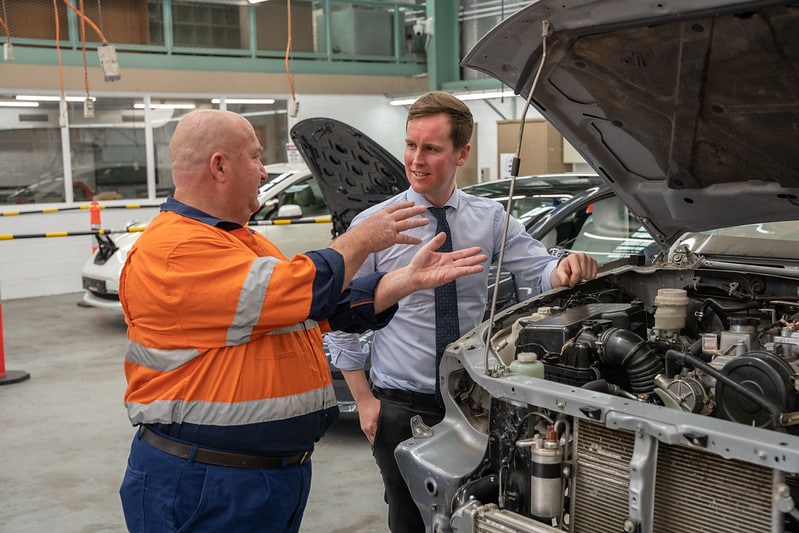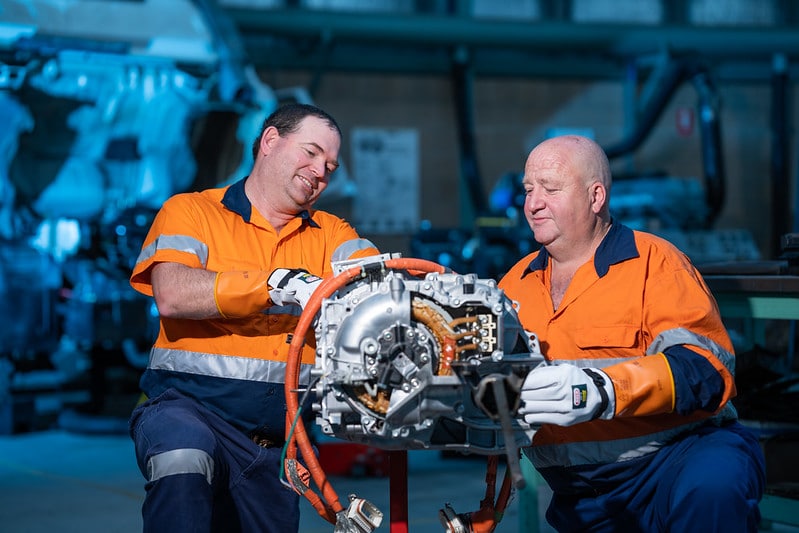As the ACT transitions its diesel and gas-powered bus fleet to electric vehicles, every bus mechanic will learn how to fix and maintain them. The first six will be trained at the CIT next week – and Stuart Shiell and Phil Hart are glad to be in at the start.
“It’s a bit of a challenge – but by the same token, it’s exciting as well; it’s something different,” Mr Shiell said.
He has been a mechanic for 37 years; he hasn’t worked on EVs before but has worked in power stations.
“I’ve seen the industry change a fair bit over my time – and this is just another progression in the field.”
“I’m keen for it,” Mr Hart agreed. He started in the earth-moving industry in 1997, and – after time in construction, mining, and forestry – has worked with heavy vehicles since 2008. He has watched his trade move through hydraulics, pneumatics, and now electronics.
“It’s constantly changing, evolving,” Mr Hart said. “The best thing I remember as an apprentice is watching guys who started when a new technology came out. They were at the forefront of it, and they could develop their skills as it started. When you jump in later, they’ve had all the add-ons, and that makes it much harder. If you get in early, it’s an easier start.”
The two-day course at the Fyshwick CIT campus will focus on EV safety and maintenance. Electric buses can be dangerous, explained automotive teacher Richard Lindsay. They pack a punch of 400 volts (hybrid) or 1,000 volts (fully electric) – enough to kill a man.
“If you don’t know what you’re doing, it’s just as dangerous as the power points at home,” Mr Lindsay said.
“Without the knowledge and skills, it’s a bit scary for them, once they start seeing the orange cables throughout the vehicle.”
But once they have finished the training, they will be able to work safely on the vehicles.
CIT hasn’t started advertising yet, but already 200 students want to sign up. The initial training covers general skills to maintain EVs safely; later, it will offer any specific training manufacturers need to maintain their particular vehicle. CIT has already run a pilot with Tesla to make sure “we’re hitting the spot with industry,” Mr Lindsay said.
The CIT course is only a micro-credential skillset, remarked Chris Steel, ACT Minister for Transport and City Services, but he hopes it will soon lead to a full Certificate 3 qualification in EV technology.
The course supplements CIT’s broader renewable training, said CIT CEO, Leanne Cover.

The ACT wants to replace all 450 of its diesel and compressed natural gas buses with electric ones by 2024; the first 90 buses will enter the fleet next year. When the ACT Government first announced this 18 months ago, workers were concerned about needing to retrain, Mr Steel acknowledged. But he met mechanics at Tuggeranong and Belconnen depots, and discussed how the government could help them, while Australian Manufacturing Workers’ Union members were part of the steering group on the zero emissions plan for Transport Canberra.
“This training package is a direct result of those discussions with workers,” Mr Steel said. “We don’t want to see workers left behind, and we want to see a just and fair transition as we go towards a zero emissions future.”
The transition will happen in every section of the economy, Mr Steel predicts.
“Huge numbers of electric vehicles, light and heavy, will move onto our roads, and so there’s going to be a huge demand for servicing these vehicles. We need to make sure both here in the ACT and Australia-wide that we’ve got the skills and the people to be able to maintain these vehicles.”
“Things are definitely changing at a rapid pace,” Mr Lindsay said. “That’s why the mechanics are keen to learn more about it.”
The electric system is “totally different” from diesel engines, he explained. “You can’t just pull over at a service station whenever you need to fill up. you need to be more strategic about how you run your fleet.” That means having charging stations ready, and making sure buses have the appropriate charge when they need it.
The driveline, too, is fully electronically operated, and has fewer moving parts. That means a lack of wear and tear, which will save fleet companies a lot of money. In fact, while standard buses need services twice a year, some electric vehicles only need to be checked every two years, and do not need major overhauls.
“It’s going to change the whole industry completely,” Mr Lindsay said.



